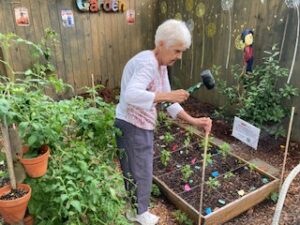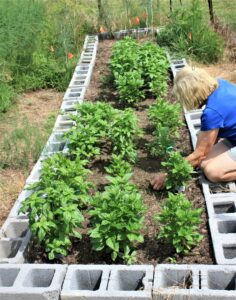Local Extension Master Gardeners Participate in Research Trial
go.ncsu.edu/readext?878952
en Español / em Português
El inglés es el idioma de control de esta página. En la medida en que haya algún conflicto entre la traducción al inglés y la traducción, el inglés prevalece.
Al hacer clic en el enlace de traducción se activa un servicio de traducción gratuito para convertir la página al español. Al igual que con cualquier traducción por Internet, la conversión no es sensible al contexto y puede que no traduzca el texto en su significado original. NC State Extension no garantiza la exactitud del texto traducido. Por favor, tenga en cuenta que algunas aplicaciones y/o servicios pueden no funcionar como se espera cuando se traducen.
Português
Inglês é o idioma de controle desta página. Na medida que haja algum conflito entre o texto original em Inglês e a tradução, o Inglês prevalece.
Ao clicar no link de tradução, um serviço gratuito de tradução será ativado para converter a página para o Português. Como em qualquer tradução pela internet, a conversão não é sensivel ao contexto e pode não ocorrer a tradução para o significado orginal. O serviço de Extensão da Carolina do Norte (NC State Extension) não garante a exatidão do texto traduzido. Por favor, observe que algumas funções ou serviços podem não funcionar como esperado após a tradução.
English
English is the controlling language of this page. To the extent there is any conflict between the English text and the translation, English controls.
Clicking on the translation link activates a free translation service to convert the page to Spanish. As with any Internet translation, the conversion is not context-sensitive and may not translate the text to its original meaning. NC State Extension does not guarantee the accuracy of the translated text. Please note that some applications and/or services may not function as expected when translated.
Collapse ▲ Most home gardeners prefer not to unnecessarily apply products like fungicide to their home gardens, especially their vegetable gardens. So when researchers at NC State University reached out to Master Gardeners, and asked for help testing new selections of disease resistant basil, several hands went up. Three local Extension Master Gardeners from the Chowan, Gates and Perquimans County program are participating in a statewide trial to determine the disease resistance of several new cultivars of basil. Each week, volunteers monitor, measure and care for the provided types. Trials are being repeated across the state, most are in home gardens and at local extension offices.
Most home gardeners prefer not to unnecessarily apply products like fungicide to their home gardens, especially their vegetable gardens. So when researchers at NC State University reached out to Master Gardeners, and asked for help testing new selections of disease resistant basil, several hands went up. Three local Extension Master Gardeners from the Chowan, Gates and Perquimans County program are participating in a statewide trial to determine the disease resistance of several new cultivars of basil. Each week, volunteers monitor, measure and care for the provided types. Trials are being repeated across the state, most are in home gardens and at local extension offices.
 Researchers are specifically looking for the plants’ resistance to Basil Downy Mildew (BDM). BDM is a fungal disease that affects the leaves of basil plants and usually results in death of the plant. Symptoms of the disease are often mistaken for nutritional problems. BDM is encouraged by high humidity and moisture; in North Carolina the disease typically begins in June and lasts throughout the growing season. Although the disease does not survive in winter; air currents carry spores and increase the spread. Home gardener techniques that help reduce the disease include using drip irrigation, watering early in the mornings, and allowing enough space between plants to increase air circulation. Gardeners can also choose less susceptible varieties of basil (see list below). BDM does not spread to other types of plants in the garden.
Researchers are specifically looking for the plants’ resistance to Basil Downy Mildew (BDM). BDM is a fungal disease that affects the leaves of basil plants and usually results in death of the plant. Symptoms of the disease are often mistaken for nutritional problems. BDM is encouraged by high humidity and moisture; in North Carolina the disease typically begins in June and lasts throughout the growing season. Although the disease does not survive in winter; air currents carry spores and increase the spread. Home gardener techniques that help reduce the disease include using drip irrigation, watering early in the mornings, and allowing enough space between plants to increase air circulation. Gardeners can also choose less susceptible varieties of basil (see list below). BDM does not spread to other types of plants in the garden.
Results of the trial will help breeders know what types of basil appeal to home gardeners based on taste and performance. If you’re interested in growing basil at home, try one of these currently available, BDM resistant types: Red basil (‘Red Leaf’ and ‘Red Rubin’), Thai basil (Queenette’), lemon basil (‘Lemon,’ ‘Lemon Mrs. Burns,’ ‘Sweet Dani Lemon Basil’), lime basil (‘Lime’), and spice basil (‘Spice,’ ‘Blue Spice,’ ‘Blue Spice Fil,’ ‘Cinnamon’). For more information about growing basil in home gardens, contact the Ask A Master Gardener Helpline at (252) 482-6585.



